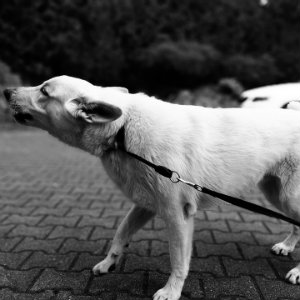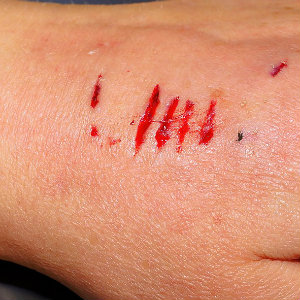Did you or a loved one suffer a dog bite? Here are some questions you may be asking now:
- Who will pay for our medical expenses?
- What will happen to the dog?
- Will the scars ever go away?
- How much is a dog bite case worth?
We understand the emotional and physical injuries you're facing after a dog bite. Our experienced personal injury lawyers can help.

Our attorneys are prepared to help you receive the compensation you need while recovering from your injuries.
A dog attack is a traumatic event for the victim. Bites often cause serious injuries, pain and suffering, and other damages. When a dog bites an innocent victim, it’s important to consider how it could have been prevented.
The damaging effects of a dog bite can last a lifetime. While a lawsuit can't take back the past, it can make the future better by providing the financial compensation that dog bite victims need during their recoveries. Many dog bite victims are burdened with permanent injuries and psychological problems which may require expensive medical care, effect their professional lives, and impair their ability to live a normal life.
Pennsylvania Dog Law
Pennsylvania has established a very specific set of laws which deal with dog bites. When a dog bites someone other than the owner, various statutes are considered in order to determine liability  and consequences.
and consequences.
The dog’s history, temperament, and the specific details of the incident are all taken into account when legally analyzing a dog bite case. Victims are also split into categories and are permitted to seek different forms of compensation, depending on the extent of their injuries.
Like with other forms of personal injury lawsuits, Pennsylvania has a 2-year statute of limitations. Once this period has passed, civil courts will refuse to take the case. So if you’re considering pursuing financial compensation after being bit by a dog, it’s best to act as swiftly as possible.
FREE CONSULTATION
Confinement of Dogs
According to Section 459-305 of Pennsylvania’s Dog Law, dogs must be confined at all times. Specifically, dogs are always required to be either:
- confined within the premises of the owner;
- firmly secured by a means of collar and chain or other device so that it cannot stray beyond the premises on which it is secured; or,
- Under the reasonable control of some person, or when engaged in lawful hunting, exhibition or field training.
Owners who fail to properly confine their dog put their neighbors and their pets at a heightened risk of suffering a bite. These bites can cause traumatic physical and emotional damages to the victim. In bite incidents where a dog was not confined during the attack, the owner will likely be found negligent.
Dangerous Dog Law
Pennsylvania law permits anyone who has been attacked or had one of their domestic animals attacked by a dog to file a complaint requesting that the dog be classified under the dangerous dog category. In order to qualify as a dangerous dog in Philadelphia, one or more of the following criteria must apply:
- The dog has injured a person without provocation, on either public or private property
- The dog has killed or injured a domestic animal without provocation, while away from the owner’s property
- The dog has attacked a human being without provocation, or
- The dog was used to commit a crime.
A dog must have either a history of or propensity for attacking human beings or domestic animals without provocation in order to be categorized as dangerous. Victims bitten by dangerous dogs are permitted to seek full compensation, including medical bills, quality of life, pain and suffering, and all other losses and damages.
Severe Vs. Non-Severe Injuries
Many people may not be aware of how serious a dog bite injury can be. Each year in the US, over 300,000 people visit emergency rooms for dog bite injury treatment, and in total, about 750,000 dog bite victims seek some form of medical treatment.
If the dog has no prior history of biting, then the extent of a victim’s injuries determines the type of compensation he or she may pursue. Those with “severe” injuries are permitted to sue for all types of damages. Non-severely injured victims are merely permitted to sue for medical expenses.
Severe Injuries
According to the Dog Law, a severe injury is defined as “any physical injury that results in broken bones or disfiguring lacerations requiring multiple sutures or cosmetic surgery.” This definition can be applied to non-bite injuries as well. For example, if a dog knocks someone onto the ground and he or she breaks a bone in the process, the severe injury rule would apply.
Non-Severe Injuries
Those victims who suffer non-severe injuries will have all medical expenses paid for by the dog’s owner. Negligence doesn’t need to be proved for medical compensation - the victim merely has to prove that the defendant is the owner of the dog.
When Is A Dog Owner Negligent?
Even in cases where a dog has shown no history of violence and the victim’s injuries are non-severe, full compensation may be awarded if negligence can be proved.
One Bite Rule
As mentioned earlier, a victim may sue for full damages if a dog has any previous biting history. However, this rule may still apply even if the dog has never successfully bitten someone else before as long as the victim’s legal team can prove that the owner was aware that the dog had vicious tendencies. For example, if the dog had attempted to attack someone in the past but was stopped before biting anyone, then the owner could be found negligent under the one bite rule.
Lack Of Reasonable Care
If the owner has acted in a way which shows a lack of reasonable care for the wellbeing of those around the dog, he or she may be found negligent. This can take form either in unreasonable actions or omissions.
For example, it would be an unreasonable action if an owner let his or her dog off its leash to play with another dog and the other dog’s owner was bitten as a result. An unreasonable omission might involve an owner failing to remove the dog from a group of kids when the dog is playing too roughly, which eventually results in a bite. In either case, the victim may be eligible to seek full compensation because of the owner’s negligence.
Which Dog Breeds Are The Most Dangerous?
It’s important to remember that improper training and poor ownership are the largest contributing factors in creating a violent dog. While there are some dog breeds which have the potential to inflict more damage if they decide to attack, each individual dog is largely a product of his or her own environment.
Some of the more powerful dog breeds account for a higher number of severe injuries and fatalities. This doesn’t necessarily mean that a certain breed is predisposed to violence, but rather that the ones who do become violent generally inflict more damage. Such breeds include:
- Pit bulls - Many pit bulls are bred as fighting dogs in stressful environments before being rescued. In 2016, pit bulls accounted for 71% of dog attack fatalities in the US. Between 2005 and 2016, 254 Americans were mauled to death by pitbulls
- Rottweilers - Statistically, the second most dangerous dog breed. Between 2005 and 2016, pit bulls and rottweilers combined for 76% of fatal dog attacks. In 2015 alone, these two breeds accounted for 91% of dog bite-related fatalities.
Common Dog Bite Injuries
Dog bite victims are burdened with a variety of injuries, ranging from minor to severe to life threatening.
Puncture Wounds
The majority of dog bites result in a puncture wound. These wounds may appear relatively benign from the outside since the wound is small and there is often little bleeding. However, these are often more serious than they look as the wound often extends beneath the skin and into muscles and tissues.
Infections
Dog bite wounds have a high risk of infection. Various bacteria, germs, and other waste from the dog’s mouth are often transferred through the wound. Children, elderly, and sick people are more susceptible to infections from a dog bite. Symptoms include swelling, redness, pus, tenderness, and heat.
Scarring And Disfigurement
Severe dog bites often lead to scars after healing or even permanent disfigurement. Bites to the face often cause catastrophic damage which may require plastic surgery for a full recovery. In 2016, over 28,000 Americans required reconstructive surgery after a dog bite.
Nerve Damage
Deep and powerful bites often lead to permanent nerve damage. Bites to the face, neck, arms, and legs are especially likely to cause such damage.
Post-Traumatic Stress
Aside from the physical injuries, a dog bite is also an emotionally traumatic experience. Children are especially vulnerable to post-traumatic stress reactions following a dog bite. Many victims may experience nightmares, a lifelong fear of dogs, or a fear or leaving the house.
What Kind Of Damages Can I Recover?
As we mentioned above, the type of damages you can recover depends on the dog’s history, the question of negligence, and the severity of the bite. Those who are eligible to seek full compensation may qualify for the following damages:
- Medical Bills
- Loss of Quality of Life
- Pain and Suffering
- Lost Wages and Earning Potential
Related Dog Bite Pages
Monheit Law Montgomery County Office 215-866-2018
Directions to our Montgomery County Injury Law Office
4V4Q+FM Jenkintown, Pennsylvania
Open 24 hours
Dog bite injury attorney Jenkintown
Civil law attorney
Employment attorney
Law firm
Attorney
Social security attorney
Monheit Law South Philly Office 215-302-0095
Directions to our South Philly Injury Law Office
WRCH+CP Philadelphia, Pennsylvania
Open 24 hours
Dog bite injury attorney South Philly
Civil law attorney
Employment attorney
Law firm
Attorney
Social security attorney
